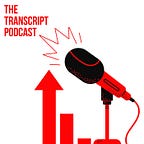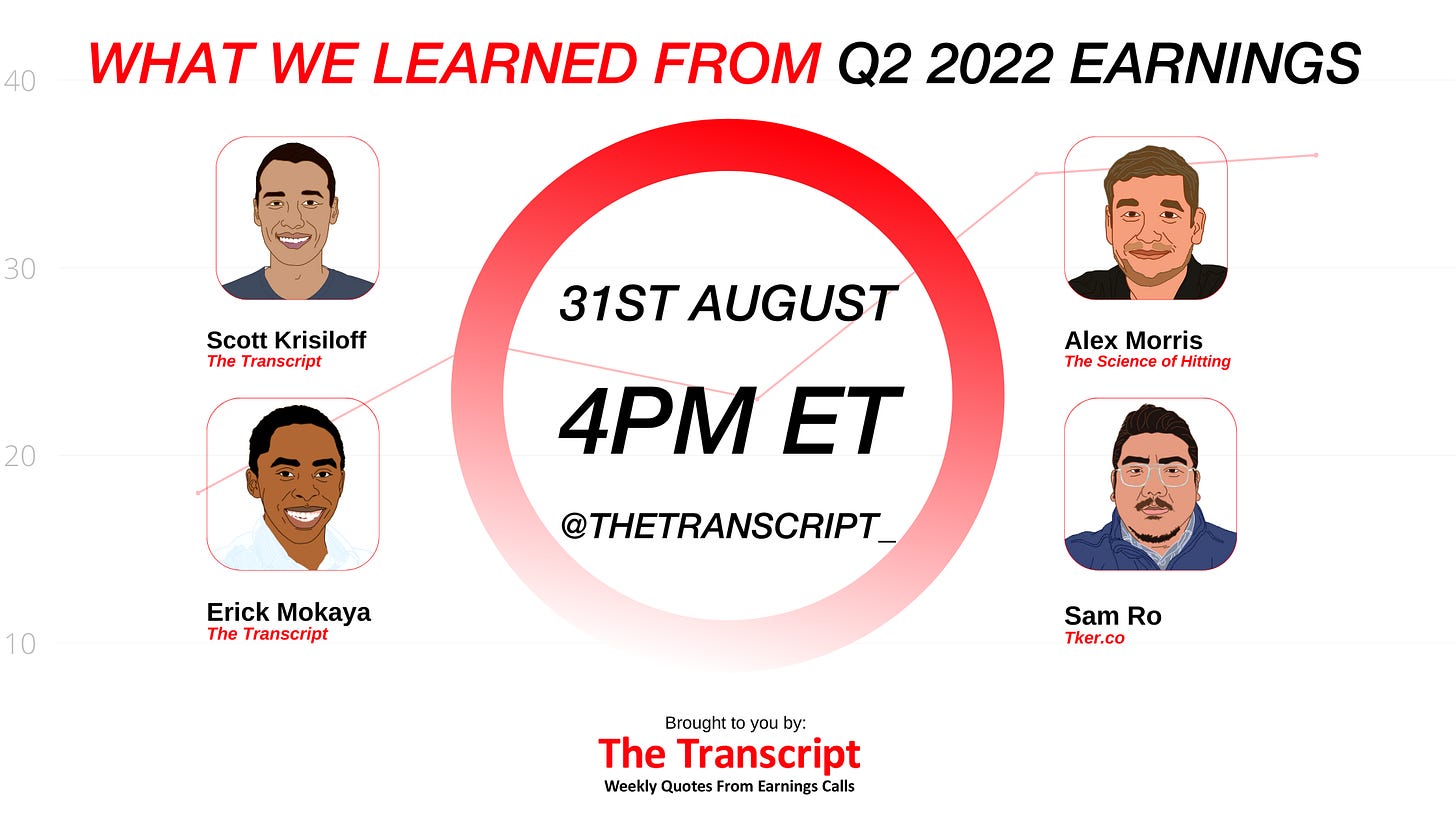In this episode, we discuss key takeaways from the Jackson Hole Symposium, the shifting spending patterns of high-income consumers, and the post-pandemic blues of some covid winners.
A transcript of this podcast, with relevant images and quotes, is available for all subscribers today just below the show notes. The episode is based on yesterday's newsletter which is available on Substack:
You can listen to our podcast on Apple Podcasts, Spotify, Google Podcasts, YouTube, and Amazon Music.
Special Note: Tomorrow, after US markets close at 4 pm ET, we will be on Twitter Spaces where will be joined by some special guests to discuss the key themes and takeaways from the Q1 2022 earnings calls. Our guests will be Sam Ro of Tker.co and Alex Morris of The Science of Hitting
Here is the link to the event:
Show Notes
00:00:00 Introduction
00:00:07 No Resting Until the Job is Done
00:02:44 Emerging Markets Feeling the Heat
00:03:29 Trading Down from High-Income Consumers
00:06:30 Post-Pandemic Blues
00:09:14 Strong Year for Farmers
00:10:12 Takeaways from Sam Walton’s Made in America
00:11:19 Invitation to Twitter Spaces Tomorrow
Episode Transcript
Introduction
[00:00:00] Scott: Welcome everyone to a new episode of The Transcript Podcast. You've got me, Scott Krisiloff, I'm the editor of The Transcript along with Erick Mokaya who's our lead author.
No Resting Until the Job is Done
"Restoring price stability will take some time and requires using our tools forcefully to bring demand and supply into better balance." - Fed Chair Jerome Powell
We sent out a new issue of the newsletter yesterday and the big focus in the macro section was last week's meeting at Jackson Hall where the chairman of the Fed Jerome Powell basically reiterated a more hawkish stance for the Federal Reserve. He said that they'll act forcefully to fight inflation. He mentioned the inflation readings that they've been getting that show some decline in inflation are not enough to demonstrate that it's time to pull back on a tightening stance at all. And he mentioned that supply and demand are still clearly out of balance specifically in the labor market, but in general, the tone of his speech was pretty hawkish. Any thoughts on that Erick?
[00:00:47] Mokaya: For me, I was pretty surprised I was actually away from the monitors. When I came back, I realized the market was tanking, and then someone randomly called me and asked me why is the market tanking today? And I was like it must be something to do with the Fed. It was Jackson Hall this week. So it must be something he said that must have rattled the markets. But my surprise was, they expect him to be pretty hawkish at this moment in time. I do not know what in the speech really ticked off the market, but it seems like markets were really not happy about what he said. Was it perhaps saying that there will be pain in the short term as they try to combat inflation?
“While higher interest rates, slower growth, and softer labor market conditions will bring down inflation, they will also bring some pain to households and businesses. These are the unfortunate costs of reducing inflation. But a failure to restore price stability would mean far greater pain” - Fed Chair Jerome Powell
[00:01:22] Scott: I think so. I think last week on the podcast, we talked about how there were cross-current and mixed messages throughout the economy. Also at the Fed where you basically were getting different representatives of the Fed, talking about having a more hawkish stance, but then you had also gotten minutes that were somewhat dovish in the way that they talked about maybe slowing the pace of rate increases. And I think in Jerome Powell's speech at Jackson Hall, he does talk about how there may be at some point soon, the need to slow the pace of increases, but that was like 3% of the speech. And most of the speech was in a much more hawkish tone about us needing to fight inflation here and how important it is to fight inflation. And I think the only really new piece of information was talking about that they're going to hold interest rates here longer, even if they stopped raising the plan is to hold them through 2023. So he was downplaying the idea of having any sort of rate cuts in 2023, which the importance is not whether or not those rate cuts will happen, but it demonstrates how quickly the Fed will react to signs of lower inflation and then also recession. It makes recession much more likely, and it makes it that a deeper recession could be more likely because the Federal Reserve is not necessarily just going to step in and lower rates at the first sign of recession.
"Restoring price stability will likely require maintaining a restrictive policy stance for some time. The historical record cautions strongly against prematurely loosening policy. Committee participants' most recent individual projections from the June SEP showed the median federal funds rate running slightly below 4 percent through the end of 2023." - Fed Chair Jerome Powell
Emerging Markets Feeling the Heat
[00:02:44] Mokaya: So then that makes more sense. Any other takeaways from Jackson Hall? There were some really interesting comments, especially on emerging markets. I think I saw from the IMF director who was talking about how the US dollar has been pretty strong and a strong US dollar may be good for the US, but it's actually really bad for emerging markets. I can see it in Kenya. The currency is at an all-time high against the dollar, low in the sense, of course, like the currency in Kenya is actually weakening, and across most emerging markets that's the story. So that means that especially for countries that have most of their debt priced in dollars, they're actually having a really rough time. Egypt, I just read this morning, that Egypt may actually be on the cusp of default which is pretty not normal in the emerging markets. Any other takeaways for you?
Trading Down from High-Income Consumers
"We believe we'll be able to capitalize on that trade-down that we're already seeing. And that trade-down is coming from income levels that are upwards of $100,000 which we really are encouraged in seeing a younger consumer, a little bit more affluent, and again, very digitally and tech-savvy." - Dollar General CEO Todd J. Vasos
[00:03:29] Scott: Yeah. I think in the rest of the newsletter, there were a couple of things that I thought were worth pointing out. One was Dollar General talking about higher income consumers starting to trade down to Dollar General and the point at which they were marking that were people with incomes closer to a hundred thousand dollars which echoed something that we had heard from Walmart last week as well, that consumers making incomes at about a hundred thousand dollars are starting to shop at those retailers. I think it's really important for a couple of reasons. One it's showing the expansion of maybe the trade-down phenomenon creeping up into higher income brackets besides just the lowest income consumers. But also I think it's a function of showing that with inflation, people who are making a hundred thousand dollars a year in the United States, aren't necessarily feeling particularly wealthy about their spending power. And that's just part of what happens with inflation is that as costs rise, incomes have to rise faster than the cost in order for people to feel wealthy. And if incomes are not rising faster than costs, obviously your real income is falling. So it doesn't matter if you're making a hundred thousand dollars a year. If the price of gas is $6 a gallon because your purchasing power is going down. Any thoughts on that Erick?
"We're also attracting a lot of new customer to say come to our stores, our app, our website higher-income families are shopping at Walmart, because they're price sensitive now, we shared earlier this morning, families making over $100,000 in household income, have driven a lot of our growth during this last quarter also the end of the month, performance was stronger than what we had seen in the first two months there's things happening that are encouraging," - Walmart CEO Doug McMillon
[00:04:43] Mokaya: It's very interesting that you say that because there's a meme that was going around, I think last week or the week before about you are working so hard to get into the middle class and then you reach there and then inflation comes and tells you, hey, you are actually not in the middle class anymore. So the message is clear that inflation is actually impacting a lot of people's spending. And at the same time, then a question I have is maybe going forward if people who've come into the working force in the last 20 years or so have not experienced these high levels of inflation, I wonder if they start incorporating that in their asks for salaries going forward because they're seeing the spending power actually reducing real time and at very high rates at that, around 8% 9% inflation rates. The UK has 10% plus inflation and that is expected to keep going for a couple of years. So, if inflation expectations become anchored in the sense that everyone expects this, then you're gonna have to be asking more from your employers in terms of pay rises and all going forward. And that's going to have an impact on the general economy as a whole. Any thoughts on that yourself?
[00:05:47] Scott: Yeah, I think it's a good point. I think it's why Jerome Powell is probably looking at labor markets’ supply and demand imbalance and thinking that this is an inflationary force on the economy. If you are having trouble keeping up with the cost of living, you're gonna ask for larger wages. It's a psychology that just takes hold. And I definitely think if nothing else, we have an inflationary psychology that has come into the markets into the economy in a way that's totally different than it was. Two years ago, three years ago where we still had this deflationary psychology was really the primary burden. And so I think in many ways we had this massive stimulus for the pandemic era, that's still working its way through the economy. And we're seeing the effects of that.
Post-Pandemic Blues
"Starting with Gaming. Revenue of $2.04 billion was down 44% sequentially and down 33% year-on-year, reflecting challenging market conditions…The decline in Gaming GPU revenue was sharper than anticipated, driven by both lower units and lower ASPs….We expect Gaming and ProViz revenue to decline sequentially as OEMs and channel partners reduce inventory levels to align with current levels of demand and prepare for our new product generation. We expect that decline to be partially offset by sequential growth in data center and automotive." - NVIDIA CFO Colette Kress
[00:06:30] Mokaya: Yeah. One more thing perhaps which is a side note to that is the fact that a few of the pandemic winners are actually having a real struggle now. Let's say gaming at Nvidia, eCommerce struggling post-pandemic now. Zoom, last I checked, is actually trading lower than it was just before the pandemic hit. So it looks like a lot of the companies that won during the pandemic have actually retraced a lot of the earnings and a lot of the progress that they made. People want to be a little bit back in their office than people expected. So remote work is not going to be fully remote. It has to be a bit somewhere in the middle. So I think a lot of changes. I'm not so sure if you're experiencing the same, but I think since the pandemic winners are actually having a full retrace, they're retracing back. They're losing some of the wins that they made during the pandemic. Any other quotes that stood out for you?
[00:07:22] Scott: Yeah. One other area, this kind of goes to the winners of the pandemic and the post-pandemic era. One of the quotes that I really want to keep a close eye on was from American airlines, talking about how what they're seeing going forward on travel is a return to it, like a more normal travel pattern from a white-hot travel pattern that they had been seeing. This is one ever since I think we had an issue that was talking about the floodgates of the economy opening post-COVID really ever since people started getting vaccinated in the summer of 2021, travel has been an extremely hot part of the economy. It's been really robust. If you try to travel in the US, ticket prices are three times higher than they were before the pandemic. So it's very expensive to travel. Flights are full. And if we have any return to more normal travel circumstances, this is another kind of potential negative catalyst. This is something that we should be on the lookout for as investors because this has been a really strong trend for the last 18 months. It could be changing.
"We're seeing, in many ways, a return to normalcy in many ways, normal travel patterns, a shift from -- it was a white-hot summer, and the shift that we're seeing as we go into fall really do resemble seasonal shifts in what demand is. And the demand, I mean, predictability in airline demand is like to say, it is the most important thing because when you can predict demand and you can go and build the capacity plan there for the cost base of the airline around that. And so the resumption of predictability is a really big and important thing." - American Airlines CCO Vasu Raja
[00:08:23] Mokaya: Yeah. And of course, we noted in the first half of the year, and Q2 especially, airlines posted some of the record in terms of earnings and results for that quarter. So if this continues, you definitely expect them to lose some of this, to re-trace back to normal where they were before the pandemic also. I agree that's a very key catalyst to also pay attention to. Perhaps something else that was really small to note also is a trend that has continued in the past few weeks is also commodities. They're going down a bit. There were some quotes that talked about corn and soy prices going back a bit, but they're still at high levels, but there is retracing. And I think the same with freight trades, they're going down even though they're still at high levels. So I think it may be the impact of inflation a bit going forward. Not significantly, but maybe worth noting.
Strong Year for Farmers
[00:09:14] Scott: Yeah, definitely. And I think the quote on the agricultural side that we had in there is a really important one from John Deere. It's just an interesting dynamic to point out because John Deere was actually talking about farm profits in the United States primarily being pretty robust this year. And it's just an interesting function of in this case where you have food prices that are being elevated by war in Ukraine. If you are in the United States where you can still have the exact same yields on your farmland, because you're not being impacted by war, it's an area where you can have a source of excess profit in a commodity space. And so John Deere's revenues are driven by excess profits at farms because farmers, when they feel wealthy, are able to replace equipment that's maybe depreciated. And so that was an interesting dynamic to keep in mind as well as a potential catalyst that I'm thinking about whether or not there's something investible.
"Overall, ag fundamentals remain really strong..So while profitability may come in a bit from record '22 levels, our customers will still be profitable, and the environment is supportive of replacement demand especially when you consider that farmers haven't been able to replenish their fleets as much as they wanted to this year.” - Deere & Co President of Worldwide Ag & Turf Division Cory Reed
Takeaways from Sam Walton’s Made in America
“Nobody wanted to gamble on that first Wal-Mart. I think Bud put in 3 percent, and Don Whitaker—whom I had hired to manage the store from a TG&Y store out in Abilene, Texas—put in 2 percent, and I had to put up 95 percent of the dollars. Helen had to sign all the notes along with me, and her statement allowed us to borrow more than I could have alone. We pledged houses and property, everything we had. But in those days we were always borrowed to the hilt. We were about to go into the discount business for real now. And from the time those doggone Wal-Marts opened until almost today, it has been a little challenging.” - Sam Walton’s Made in America.
[00:10:12] Mokaya: I agree also. So perhaps in closing, we talk a little bit about Sam Waltons, Made in America. Some quotes that I thought were interesting enough. So I think for our listeners, we are welcoming you to join us in a journey of also reading books once in a while, and posting some of the quotes. We've been thinking of doing this for a while, but I think it's time we actually got started Scott. So I think with Sam Walton’s Made in America was good, it was the first book that we suggested a while back. This was around like six months ago. So we are getting around to reading it. I think one key takeaway for me was how few believers that he had at the very beginning when he was implementing the idea of Walmart. But he talks of nobody wanted to gamble in the first Walmart. He had to put up 95% of the dollars. So I think he had to place the bet on himself starting. I think that's a good quote to take away, especially for entrepreneurs and investors. So I think at the end of the day you may find that a lot of people may not believe in you, but I think it's good to take the first bet and place it on yourself and I think that was a key takeaway for me this week from that book. Any thoughts on that yourself?
[00:11:16] Scott: I don't think I have any additional thoughts on that. I think this is a good place to close.
Invitation to Twitter Spaces Tomorrow
[00:11:19] Mokaya: All right. Let’s close on that. Thank you for joining us this week. On Wednesday this week after the market is closed, we have Twitter Spaces. We'll be discussing Q2 results and the key takeaways that we got from earnings calls. We'll be joined by Sam Ro and Alex Maurice. So if you have any questions, send them to us through admin@theweeklytranscript.com. We'll definitely be able to take them during the spaces. We'll include a link to the spaces in the transcript for this week's podcast. So thank you for joining us and see you on Wednesday and then next week.













